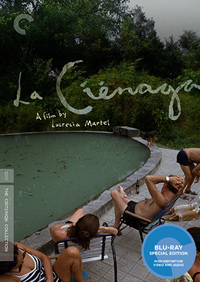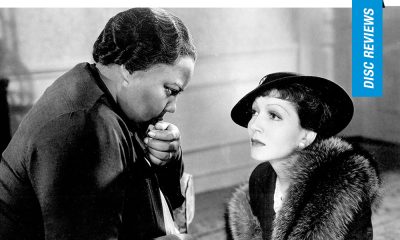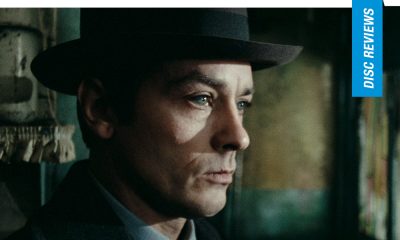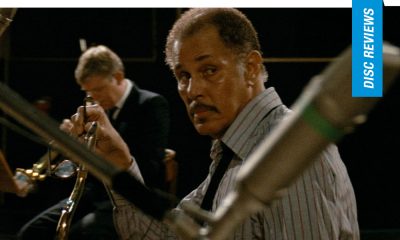Disc Reviews
Criterion Collection: La Ciénaga | Blu-ray Review
 Murky swimming pools, bored adolescents, oblivion drinking and signs of the apocalypse are just some of the issues plaguing two chaotic Argentinean families in La Ciénaga, Lucrecia Martel’s feature debut from 2001. Thanks to a new hi-def pressing from Criterion, Martel’s miraculous domestic capture is available to a younger generation of cineastes who likely missed out the first time around, as well as those – like this reviewer – who saw the film years ago but had its brilliance fade into memory’s mist. La Ciénaga may have ushered in a brave new millennium, but its revelation of life’s quirks and caprices remains true and timeless.
Murky swimming pools, bored adolescents, oblivion drinking and signs of the apocalypse are just some of the issues plaguing two chaotic Argentinean families in La Ciénaga, Lucrecia Martel’s feature debut from 2001. Thanks to a new hi-def pressing from Criterion, Martel’s miraculous domestic capture is available to a younger generation of cineastes who likely missed out the first time around, as well as those – like this reviewer – who saw the film years ago but had its brilliance fade into memory’s mist. La Ciénaga may have ushered in a brave new millennium, but its revelation of life’s quirks and caprices remains true and timeless.
One could make a case the Martel drew inspiration for her first feature from two impeccable sources: Anton Chekov and Eric Rohmer. Like Chekov, La Ciénaga is a story of manners and class struggle set in a rambling country estate and, a la Rohmer, it tells the tale of a summer vacation, complete with lazy days filled with equal parts brooding and bonhomie. Overseeing this shabby provincial dominion is Mecha (the hilarious Graciela Borges), a spoiled matriarch drama queen with two hobbies: yelling at the servants and drinking until she literally topples. Meanwhile her kids – ranging in age from young adult to preteen – engage in Lord of the Flies style anarchic, and potentially dangerous, misadventures in the nearby mountains and rivers. One such escapade has already cost one of the youngsters an eye, yet Mecha seems to be in no hurry to get it fixed.
While not generally considered a comedy, La Ciénaga’s passive/aggressive constructions are hysterically funny to those able to recognize and transpose its elegant awkwardness to their own lives. Martel’s script was shaped from her own recollections of childhood and the film, like Mecha’s filthy swimming pool, is roiled and stirred by the director’s sharply observed and superbly executed details. At times the film creates a raucous Jackson Pollack swirl of screaming kids, barking dogs, ringing telephones – and the occasional sighting of a traumatized pet turtle – that induces in the viewer a strangely peaceful bliss amid the chaos of reality. As storms roll in and the steamy heavens open, the hypnotic clamor of rain drives the principles to their beds for sweaty afternoon naps, and once again all is peaceable in Mecha’s weedy kingdom.
When Mecha’s cousin Tali (Mercedes Moran) and her large brood come for an extended visit, La Ciénaga’s rising damp of decadence becomes tactile. While the two women discuss a harebrained scheme involving a Bolivian shopping trip, an assortment of children burst into the room in full sugar high berserk mode. The women simply continue their boozy conversation; numb to the deafening din of the everyday. In the background play breathless TV news reports of the Virgin Mary sighted on a local water tower, while those in dire need of divine intervention are dangerously ignored. It is through these seemingly disjointed moments that the film become more than mere slice of life, reaching its tentacles into the distracted DNA of an increasing oblivious society.
The last ramparts of centuries of class struggle are breached as Momi (Sofia Bertolotto), a teenage girl with hormonal batteries fully charged, confronts her feelings for an Indian maid (Andrea López). However, this is not the only taboo haunting the inhabitants of La Ciénaga’s off-kilter world. The film contains many allusions to incest, usually couched in the guise of innocent childhood games. Yet, the participants have long outgrown such suggestive roughhousing, and the youthful glow of these antics is now doused by a shadow of shame. It is time to leave life’s Garden of Eden but, just like their parents, these kids may never be fully able to put aside childish things.
Disc Review
Criterion’s colorists have delivered one of the sharpest transfers this reviewer has ever seen, as the legible fine print on the labels of Mecha’s array of empty wine bottles will attest. Presented in the original 1.85 aspect ratio, the rich, organic imagery of DP Hugo Colace is given a superb showcase. Even brightly lit scenes retain a slightly muddled green aura cued from the family’s neglected swimming pool. The Blu-ray also features a new stereo surround mix, boosting all the lively music, sudden jolts and startling noises that adorn La Ciénaga’s layered and tumultuous track. This hi-def edition offers a significant upgrade from the aging original Region 1 DVD, and fans of the film will want to update their libraries.
New interview with Martel
To describe this 18 minute segment as an interview is quite the understatement. It’s actually more of a stand alone art film, with Martel’s recollections interspersed with an abstract assembly of images and family photos. Martel describes the great importance she placed on unusual sounds to help tell her story, and her reliance on actual events from her childhood. Scenes from La Ciénaga and vistas of the Argentinian countryside illustrate and augment Martel’s commentary.
New interview with filmmaker Andrés Di Tella
Here, Di Tella attempts to place Martel and La Ciénaga into historical context. Comparing the film to 1985’s The Official Story, he offers theories on the nature of Argentinian cinema and its tendency to be driven by overt political messages. In Di Tella’s estimation, Lucrecia Martel was a harbinger of a new, more introspective generation of filmmakers. He also discusses the unusual and widely varied dialects of Argentina, and the difficulty of writing dialogue that sounds natural to domestic audiences. The career of actress Graciela Borges is examined, and how well her portrayal of Mecha resonated with Argentinian audiences, both for artistic and political reasons. 24 Minutes
PLUS: An essay by film scholar David Oubiña
Oubiña’s essay deals heavily with film’s religious symbolism and Martel’s passion for sudden, shocking narrative drivers. The piece is part of a 12 page foldout brochure with production stills, credits and special acknowledgments.
Final Thoughts
La Ciénaga serves as an astonishingly rich celebration of the minutia of family life, weaving the fleeting fabric of existence into patterns that mystify with immediacy and truth. The film has a loose-leaf, improvised feel and offers a revealing glimpse into upper class Argentine families, albeit ones that have clearly gone to seed. Like life itself, La Ciénaga is comprised of hilarity, boredom, stupidity, love, hatred and yes, even tragedy. And it can be credited with that rarest of cinematic qualities: it is a film that seems too short.
Film: ★★★★½/☆☆☆☆☆
Disc: ★★★★½/☆☆☆☆☆
David Anderson is a 25 year veteran of the film and television industry, and has produced and directed over 2000 TV commercials, documentaries and educational videos. He has filmed extensively throughout the United States, Mexico and the Caribbean for such clients as McDonalds, General Motors and DuPont. Top Films From Contemporary Film Auteurs: Reygadas (Silent Light), Weerasathakul (Syndromes and a Century), Dardennes (Rosetta), Haneke (Caché), Ceylon (Climates), Andersson (You the Living), Denis (35 Shots of Rum), Malick (The Tree of Life), Leigh (Another Year), Cantet (The Class)


































